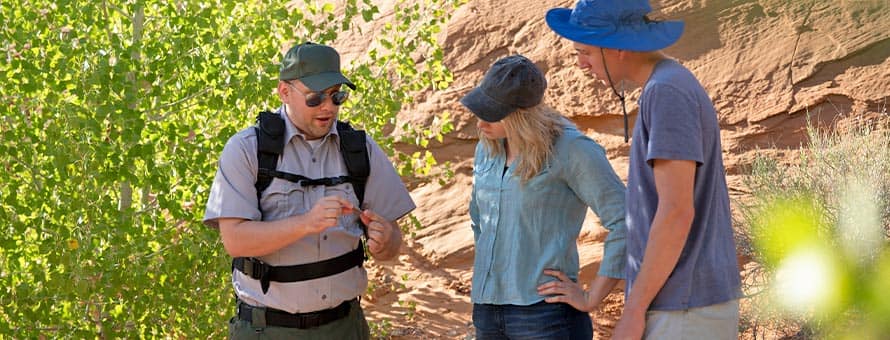What is Geoscience?

SNHU Graduate Jon Roos '18, left
Understanding the numbers
When reviewing job growth and salary information, it’s important to remember that actual numbers can vary due to many different factors—like years of experience in the role, industry of employment, geographic location, worker skill and economic conditions. Cited projections are based on Bureau of Labor Statistics data, not on SNHU graduate outcomes, and do not guarantee actual salary or job growth.
You may be familiar with scientific fields like geology, chemistry, astronomy and physics. What is geoscience, though? Geoscience is actually made up of multiple scientific disciplines, each related by its study of the Earth.
What Does a Geoscientist Do?
Geoscientists can be seen working in a number of STEM-related fields, but they all study our planet in some fashion. Individual studies can focus on anything from climate change or volcanic activity to how the environment and human societies interact, as highlighted by the American Geosciences Institute (AGI).
Borrowing perspectives, processes and frameworks from other scientific disciplines like chemistry and physics, geoscience allows you to study the nature of our planet and the issues that threaten it through multiple lenses.

Dr. Kelly Thrippleton-Hunter, MAT, an adjunct faculty of science at Southern New Hampshire University (SNHU), is an advocate for students pursuing an interest in geoscience. “The significance of the geoscience field lies in the possibilities of what geoscientists can do to help protect our planet and predict what the future might hold,” she said.
From tracking the path of a storm across the Midwest to evaluating the stability of the Perito Moreno glacier, geoscientists perform valuable, often critical, functions.
For those looking for a job with meaning and purpose, this could be the pathway for you.
How to Become a Geoscientist
A bachelor's degree in geosciences positions you to influence and view the world from a dynamic perspective as a geoscientist.

For Wyatt Martensen '21, his time in the military allowed him to begin doing geospatial work. He realized he might want to continue in this field one day as a civilian and enrolled in the geoscience program at SNHU.
"Southern New Hampshire University had the exact degree for what I was looking for," said Martensen, who started earning his bachelor's online while being deployed in Afghanistan.
With flexibility being a necessary factor for Martensen, he appreciated the ability to work on his assignments early in the week. "It wasn't anything unachievable," he said. "There was no point in time where I felt extremely stressed out about taking the classes — even when I was deployed."
With so many types of careers out there, how can you take advantage of a geosciences degree program to prepare you for working in your chosen field?
Something to seriously consider is how to use your electives. You can maximize the potential of your program by choosing subjects that complement your core courses.
“Students wishing to focus their careers in more of an environmental arena can bring in courses in biology, environmental science, sustainability and environmental compliance," said Thrippleton-Hunter, who holds a PhD in Environmental Toxicology. "Those wishing to be involved in policy and decision making might want to consider courses in data analytics, management and public administration."
Looking beyond your studies, building a strong network from among your peers, instructors and mentors gives you a support group to call on as you get started in your career. Explore internship opportunities, as they are an excellent way to gain valuable experience for your resume. Check out conferences you can attend as a student, too. Thrippleton-Hunter noted that some great events are hosted by AGI, the Geological Society of America (GSA) and the National Association of Geoscience Teachers (NAGT), among other organizations.

What Careers Does Geoscience Offer?
Geoscience careers offer a wealth of opportunities. Pursuing a job in any of the many areas it covers also serves the cause of preserving the world we live in.
Since geoscience can lead to many different specializations, the job market you’ll be looking at is rich with variety. “The majority of graduates with a degree in geoscience work in the environmental service industry, which involves environmental remediation efforts related to site assessment for development, natural resource extraction and construction,” Thrippleton-Hunter said. Many also find their way into governmental positions, working for agencies within the Department of the Interior, she said.
When it comes to potential salaries, resources like the U.S.Bureau of Labor Statistics (BLS) and O*Net Online are excellent resources for researching the fields you’re interested in. According to BLS, the median annual income for geoscientists across all tracked specializations (excluding hydrologists and geographers) was $99,240 in 2024.*
It’s also important to consider the outlook for your chosen career. Is it a field in demand, and will there be jobs in the coming years? Be sure to consider where you live and whether you’ll find a market for your skills there. While growth projections may vary, BLS forecasts that jobs in geoscience (again, exempting hydrologists and geographers) will grow by 5% by 2033.*
Find Your Program
Geoscience Degree Jobs
Here is a list of just some of the jobs you, as a geoscience major, can consider either directly after graduation or with additional education at the graduate level:
Atmospheric Scientist
One kind of atmospheric scientist — meteorologists — is probably very familiar. They're part of the crew of every morning news program. Rest easy if you don’t want a career in television, though.
The study of Earth’s atmosphere, weather patterns, and climate change is also performed by geoscientists who never have to stand in front of a green screen. Those in this field might track hurricanes, form action plans around long-term climate predictions, identify trends to help predict patterns or travel to locations where major storms are expected to hit in order to gather data, according to BLS.
Environmental Compliance Inspector
![]() Environmental compliance inspectors (sometimes referred to as investigators) take a hands-on approach to finding threats to the natural world. Keen observational skills and analytical thinking are key abilities needed in this role. You may investigate toxic waste dumps, water treatment plants, construction sites or waste disposal facilities. You'll protect the environment by ensuring laws and regulations are followed.
Environmental compliance inspectors (sometimes referred to as investigators) take a hands-on approach to finding threats to the natural world. Keen observational skills and analytical thinking are key abilities needed in this role. You may investigate toxic waste dumps, water treatment plants, construction sites or waste disposal facilities. You'll protect the environment by ensuring laws and regulations are followed.
Job prospects in this area are expected to grow by 3-5% by 2033, according to O*Net (data drawn from BLS) and are an option for those with a degree in geoscience.*
Environmental Engineer
The mind of an engineer takes a problem and immediately starts to work on a solution. Environmental engineers take on issues like air pollution, beach erosion and industrial waste. This career path requires a degree in engineering, but a geoscience program is a solid foundation for a move into graduate studies.
If this is your dream job, Thrippleton-Hunter suggests looking at a master’s in geoengineering or environmental engineering once you've completed your bachelor's in geoscience. (Note: Master's degrees in geoengineering and environmental engineering are not currently offered at SNHU.)
Environmental Protection Technician
A passion for preserving the earth may lead to a job as an environmental protection technician or specialist. Focused on conservation and sustainability, these geoscientists can find themselves working in the field as consultants for various projects from construction to clean-up efforts. They can also be important team members in test labs or for the government, according to BLS.
Though BLS lists an associate degree as the minimum entry requirement, you may find that positions with certain organizations may require a more advanced degree.
Geographer
![]()
Connecting science to sociology, geographers study the relationship between the earth and humans. How does their environment influence a society; likewise, how does a society affect the natural world? These are questions geographers ask, and they utilize tools like satellite data, GPS, survey feedback and maps to understand them.
Some employers prefer candidates with more advanced degrees, BLS said — so with a 3% job growth, you may need to look for ways to stand out, such as internships.*
BLS reports that the median annual income for geographers in 2024 was $97,200.*
Geophysical Data Technician
Geophysical data technicians combine data analysis with their understanding of geoscience to help locate and evaluate natural resources. They are typically called upon to aid in the search for valuable materials, such as oil.
Job growth for this field is expected to see a 3-5% increase by 2033, according to O*Net (data drawn from BLS), and the median annual income was about $48,390 in 2024.*
Hydrologist
![]()
Hydrologists focus their studies on the Earth’s water systems. Pollution, erosion, irrigation, water levels, waste disposal and the effects of water treatments can all play a part in their research.
BLS reports a median annual income for hydrologists to have been $92,060 in 2024.*
Natural Sciences Manager
Leadership skills are valuable in any field, and the sciences are no exception. As with any major project, scientific studies need someone to keep an eye on the big picture and oversee how individual tasks impact the overall progress. As a natural sciences manager, you may manage a group of field researchers or conduct lab-based experiments.
It’s noted by BLS that those who become managers typically have years of work experience in their area of study before overseeing their colleagues in a leadership role. Looking for internship opportunities would be a good way to start building your resume.
Seismologist
Seismologists study the tectonic shifts responsible for earthquakes. They observe the massive movements of the earth’s surface, comparing their findings to historical data and working to predict major events.
The GSA notes that most seismologists are employed in academia, government and industry, conducting research, teaching or consulting.
Discover more about SNHU's online geoscience degree: Find out what courses you'll take, skills you'll learn and how to request information about the program.
*Cited job growth projections may not reflect local and/or short-term economic or job conditions and do not guarantee actual job growth. Actual salaries and/or earning potential may be the result of a combination of factors including, but not limited to: years of experience, industry of employment, geographic location, and worker skill.
Sarah A. Easley ’12 ’18MA is a writer for SNHU.
Explore more content like this article

How to Get Into AI: What AI at Work Looks Like for Beginners

Understanding AI Ethics: Issues, Principles and Practices

What is the Best Degree for an Artificial Intelligence Career?
About Southern New Hampshire University

SNHU is a nonprofit, accredited university with a mission to make high-quality education more accessible and affordable for everyone.
Founded in 1932, and online since 1995, we’ve helped countless students reach their goals with flexible, career-focused programs. Our 300-acre campus in Manchester, NH is home to over 3,000 students, and we serve over 135,000 students online. Visit our about SNHU page to learn more about our mission, accreditations, leadership team, national recognitions and awards.

